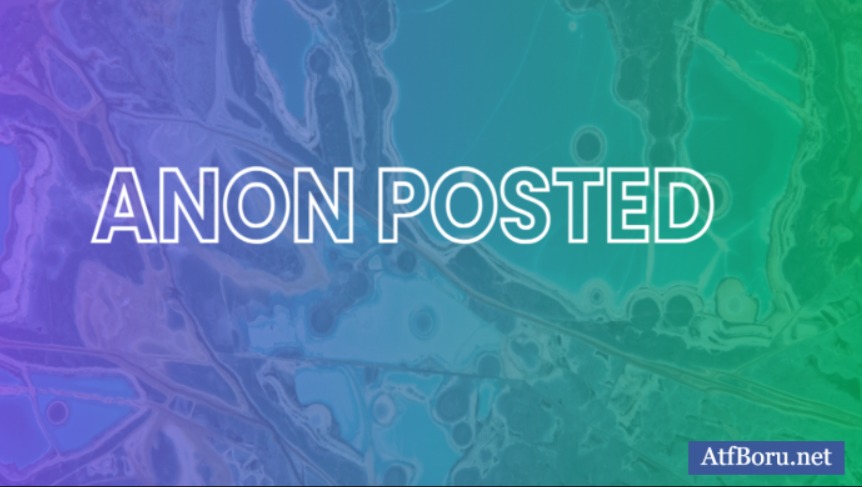Introduction
In a world where social media platforms are a primary method of communication, the concept of anonymity has sparked growing interest.
While platforms like Facebook, Twitter, and Instagram encourage users to reveal their identities, a new wave of social media apps has emerged, centered on keeping personal information private.
One such platform, AnonPosted, is at the forefront of this shift. In this article, we’ll explore the rise of anonposted platforms, their impact on social media interactions, and why they’ve become increasingly popular.
What is AnonPosted?

AnonPosted refers to a growing trend of anonymous social media platforms where users share their thoughts, opinions, and experiences without revealing their identities. Unlike traditional social networks that require users to provide personal information, anonposted platforms prioritize user privacy and freedom of expression.
These platforms are designed to give people a safe space to voice their opinions without the fear of judgment or backlash.
The rise of these anonymous platforms has been fueled by concerns over privacy, cancel culture, and the increasing desire for freedom of speech in online spaces.
Platforms like AnonPosted offer users the ability to engage in conversations, share content, and discuss topics without the need for a verified identity. This new form of communication has made a significant impact on how people interact online.
The Appeal of Anonymity
One of the primary reasons for the success of anonposted platforms is the increasing desire for anonymity in online interactions. In today’s digital age, personal information is often overexposed on mainstream social media sites.
People are becoming more concerned about their privacy and the risks associated with sharing too much online. This is where anonymous platforms, like AnonPosted, come in.
1. Privacy Protection
Many users are hesitant to share their true identities online due to the risk of their personal information being misused. In an era where data breaches, identity theft, and surveillance are major concerns, anonposted platforms offer a refuge for those who want to interact without exposing their identity.
By removing the need for usernames or personal details, these platforms help users feel safer when engaging with others.
2. Freedom of Expression
Anonymity allows people to express themselves more freely without the fear of social or professional consequences. On platforms like AnonPosted, users can share controversial opinions, vent their frustrations, or simply speak their minds without the risk of being publicly identified.
This sense of freedom encourages open and honest communication, which is often stifled on traditional social media platforms.
3. Escape from Judgment and Cyberbullying
On traditional social media sites, people are often judged based on their appearance, opinions, and actions. Anonposted platforms provide an escape from this type of judgment, allowing users to interact with others without the pressure of conforming to societal expectations.
Moreover, by remaining anonymous, users can avoid being targeted by cyberbullies or facing personal attacks based on their online activity.
The Rise of AnonPosted Platforms
The concept of anonymous social media is not entirely new. Platforms like 4chan and Reddit have long allowed users to post without revealing their real identities. However, with the increasing focus on privacy and digital security, AnonPosted platforms have gained a renewed sense of popularity in recent years.
1. The Appeal of Anonymity in a Connected World
In a world where everyone is connected to each other through social media, the desire for privacy and anonymity has never been greater. People want to connect with others without revealing too much about themselves.
Platforms like AnonPosted offer a solution to this problem by allowing users to communicate freely while keeping their personal details hidden. This is especially appealing to those who wish to discuss sensitive topics, seek advice, or vent without fearing their identity will be exposed.
2. The Impact of Privacy Concerns
Over the past few years, concerns over privacy have grown significantly. High-profile data breaches, scandals involving misuse of personal data, and the growing number of online trackers have made people more aware of the need for privacy in their digital lives.
Anonposted platforms cater to these concerns by ensuring that user data is not collected or sold to third parties, offering a much-needed alternative to the data-driven business models of traditional social networks.
3. A Safe Haven for Sensitive Topics
Anonymity also creates a safe space for individuals to discuss sensitive issues that they may not feel comfortable talking about on traditional social media platforms. Topics like mental health, personal struggles, and societal taboos can be difficult to discuss openly, especially when there’s a fear of being judged.
AnonPosted platforms allow people to express themselves without fear of social repercussions, creating a more supportive environment for these kinds of conversations.
How AnonPosted Platforms Are Changing Social Media
The rise of anonposted platforms has had a significant impact on how people use social media. While these platforms are still relatively new, they are challenging the norms of traditional social networking. Let’s take a closer look at how these platforms are transforming the way we interact online.
1. Redefining Social Media Engagement
Social media is no longer just about connecting with friends and family. It’s also about joining communities, sharing opinions, and engaging in conversations on a wide variety of topics. AnonPosted platforms allow people to engage in these conversations without the burden of their personal identity. This has changed the way users interact online, as the emphasis shifts from following individuals to engaging with ideas and discussions.
2. Promoting Authenticity
Without the fear of judgment or the need to curate a perfect online persona, users on anonposted platforms can be more authentic. They can share their true thoughts and feelings without worrying about how others perceive them. This shift toward authenticity has led to more honest and open discussions on anonposted platforms, making them a valuable space for those who feel stifled by the constraints of traditional social media.
3. Reducing Social Pressure
On traditional platforms like Instagram or Facebook, there’s often pressure to conform to certain standards of beauty, success, and lifestyle. This can lead to feelings of inadequacy or anxiety. On anonposted platforms, there’s no pressure to maintain a polished image or meet societal expectations. This allows users to feel more relaxed and engaged, leading to a more genuine experience online.
The Dark Side of Anonymity

While anonposted platforms offer many benefits, they also come with potential drawbacks. Anonymity can sometimes lead to negative behaviors, including trolling, harassment, and the spread of misinformation. Without the accountability that comes with revealing one’s identity, users may feel emboldened to engage in behavior they would otherwise avoid.
1. Trolling and Harassment
One of the major risks of anonymous platforms is the potential for increased trolling and harassment. Without the threat of being identified, some individuals may take advantage of their anonymity to engage in harmful behaviors, such as bullying or spreading hate speech. This has been a long-standing issue on platforms like 4chan and Reddit, and it remains a concern for anonposted platforms.
2. Spread of Misinformation
Anonymity can also make it easier for misinformation to spread. On platforms where users are not held accountable for their posts, false or misleading information can easily go viral. This can have serious consequences, particularly when it comes to public health, politics, or social issues. Platforms like AnonPosted need to find ways to combat misinformation while still maintaining user anonymity.
3. Lack of Accountability
Without user identification, it becomes difficult to hold individuals accountable for their actions. This lack of accountability can create a toxic environment on anonymous platforms, where users may feel free to engage in harmful activities without facing any repercussions. To address this, anonposted platforms may need to implement moderation systems or other safeguards to protect users from malicious behavior.
Conclusion
The rise of anonposted platforms has opened up new possibilities for social media interaction. These platforms prioritize privacy, freedom of expression, and authenticity, making them an attractive option for users who want to engage without the fear of judgment. However, they also come with challenges, including the potential for trolling, harassment, and the spread of misinformation.
As anonposted platforms continue to grow, they will likely face increasing scrutiny over their ability to balance anonymity with responsible online behavior.
Despite these challenges, the appeal of anonymous social media platforms remains strong, and their influence on the future of online communication is undeniable.
Whether they become a permanent fixture in the social media landscape or fade into obscurity, anonposted platforms will continue to shape the way we think about privacy, identity, and online interactions.
